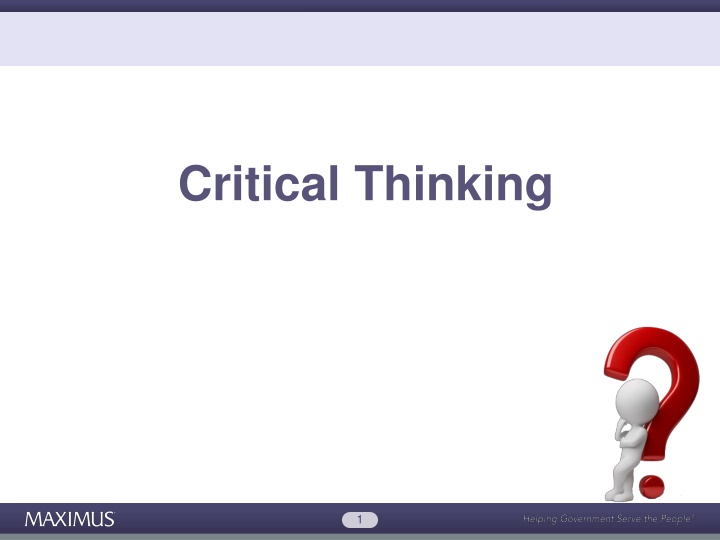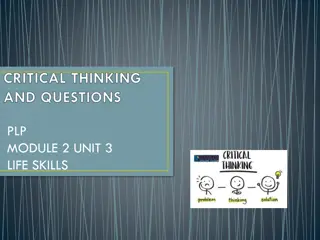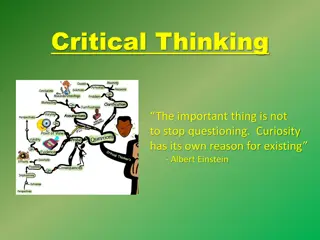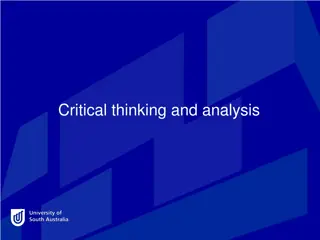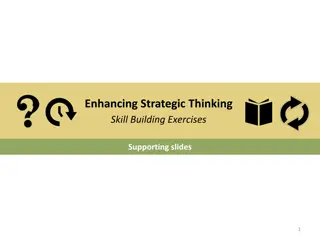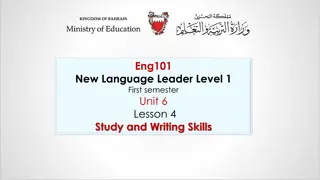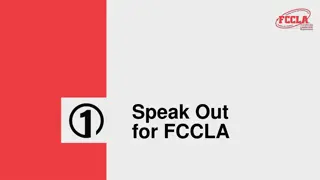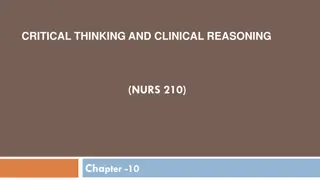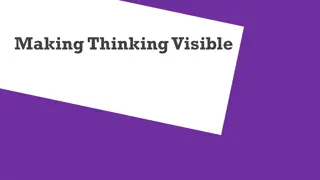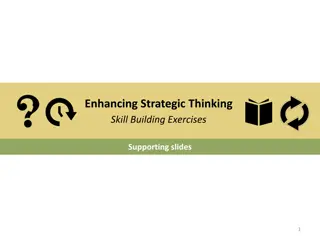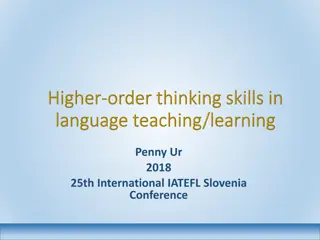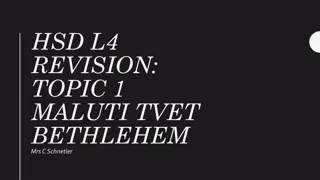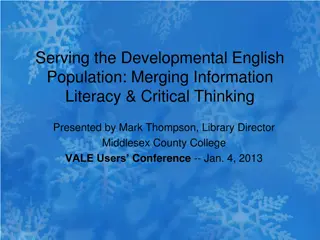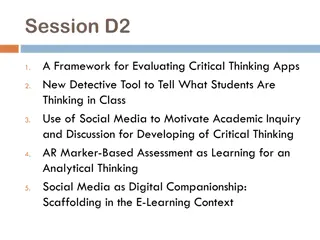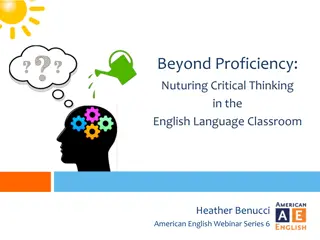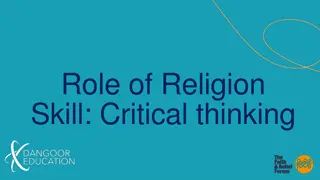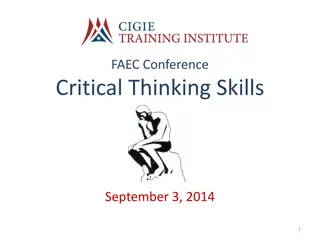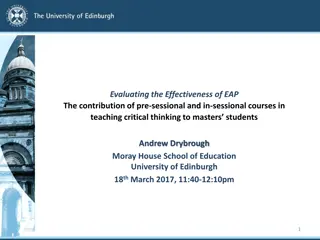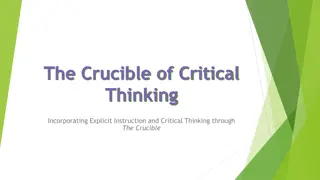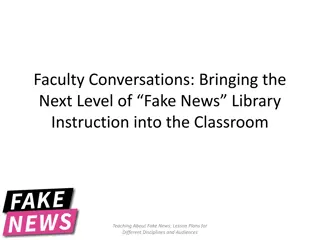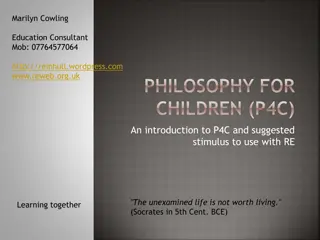Enhancing Critical Thinking Skills
Develop your critical thinking abilities with this comprehensive guide covering components of critical thinking, problem-solving techniques, logical reasoning, and more. Explore how to apply reason, analyze information, and remain open-minded in various scenarios. Engage in case studies and review questions to deepen your understanding and hone your cognitive skills.
Download Presentation

Please find below an Image/Link to download the presentation.
The content on the website is provided AS IS for your information and personal use only. It may not be sold, licensed, or shared on other websites without obtaining consent from the author.If you encounter any issues during the download, it is possible that the publisher has removed the file from their server.
You are allowed to download the files provided on this website for personal or commercial use, subject to the condition that they are used lawfully. All files are the property of their respective owners.
The content on the website is provided AS IS for your information and personal use only. It may not be sold, licensed, or shared on other websites without obtaining consent from the author.
E N D
Presentation Transcript
Getting Started The way to get started is to quit talking and begin doing. Critical Thinking provides you with the skills to analyze and evaluate information so that you are able to obtain the greatest amount of knowledge from it. Walt Disney 2
Objectives Components of critical thinking Problem solving abilities Non-linear thinking Revise perspective 3
Components of Critical Thinking Thinking is the talking of the soul with itself. Critical thinking is akin to the study of logic. Critical thinking relates to how we make decisions and use our judgment. Critical thinking is more than just thinking about thinking or metacognition. It is also about how we take action. Anonymous 4
Applying Reason What follows what Knowledge Emotional bias Processes 5
Open Mindedness Relevant evidence Revise a current understanding Alternatives 6
Analysis Discriminate information Cognitive domain Involves a process 7
Logic Rules Valid conclusions Facts 8
Case Study A group of physicists have been researching matter and motion for some years No physical activity happens by chance All chance occurrences are random events. No random events are physical No random events are physical activities 9
Review Questions Trainees Complete Handouts 10
Review Questions 1. Reasoning occurs when we use our _________ of one thing, to determine if another thing, process or statement is true. a)Virtues b)Themes c) Knowledge d)Conclusions Inductive reasoning involves making observations and using the information to draw a conclusion or form a hypothesis. Inductive reasoning is used in the scientific method. 2. What is a syllogism? a)Two or more premises used to come to a valid conclusion b)A statement that says things occur in relation to each other based on a certain order c) A statement that says if the antecedent is true, then the following consequence must also be true d)A statement of probability A syllogism is when two or more premises are used to come to a valid conclusion. The premises are factual statements used for this kind of logical reasoning. 11
Review Questions 3. What does it mean to be open-minded? a)Refuting new information without examining its validity b)Being unreceptive to new information c) Willingness to accept new information even when an opinion has been formed d)An unwilling to accept new evidence that opposes opinions Educators consider one of the main criteria to learning is being open-minded. An open-minded person is receptive to new information and does not allow preconceptions to inhibit their ability to receive new input. 4. In what learning domain does analysis fall in? a)Psychomotor b)Logic c) Cognitive d)Affective Learning occurs in three domains: cognitive, affective, and psychomotor. Analysis is within the Cognitive domain. 12
Review Questions 5. Which of the following is not one of the three factors to consider when analyzing new information? a)Argument b)Evidence c)Environment d)Language When listening to new information, Socratic process considers the argument, evidence, and language. The environment is not one of the three factors. 6. What is logic? a)Rules b)Conclusions c)Premises d)A branch of philosophy Logic involves rules, premises, and conclusions. However, it is not these things. It is the branch of philosophy that states the rules for reaching valid conclusions. 13
Review Questions 7. What is a premise? a)A statement of fact or value b)Rule c) Conclusion d)Bias Premises are facts. They are statements that allow a logical conclusion to be inferred. 8. The scientists came to the conclusion that: No ____ activity happens by chance. a)Mental b)Physical c) Spiritual d)Psychological After years of research, the scientists concluded: No physical activity happens by chance. All chance occurrences are random events. No random events are physical activities. 14
Non-Linear Thinking Neither a closed mind nor an empty one is likely to produce much that would qualify as effective reasoning. There are two ways to work out problems vertically and laterally. This is called linear or vertical thinking. However, often we tend to not line up the premises in a normal step-by-step fashion. When we approach a problem in a different order, we are using non-linear thinking. R.S. Nickerson 15
Step Out of Your Comfort Zone Different perspective Area set apart Stretch your thinking 16
Dont Jump to Conclusions Acquire information Know the facts 17
Expect and Initiate Change Be the change you wish to see Nothing stays the same 18
Being Ready to Adapt Protect yourself by changing Adaptation is a survival skill 19
Case Study You are a high school, mathematics teacher and you want your students to improve their reasoning skills You assign word problems Most of the students just are not getting it Understand that coming up with the right answer is not the most important goal 20
Review Questions Trainees Complete Handouts 21
Review Questions 1. All of the following can help prevent us from jumping to conclusions except for: a)Gathering all of the facts b)Reviewing the premises c)Ignoring the premises d)Evaluating all the pertinent information To prevent jumping to conclusions, we must take time to review all pertinent information. In the terms of logic, this means reviewing the premises. 2. Premises help all the following except to: a)Lead to conclusions b)Develop an argument c)Provide evidence d)Manipulate language Premises help to develop arguments, provide evidence, and lead to conclusions. Premises are not meant to manipulate language. 22
Review Questions 3. What is an obstacle to change? a)Fear b)Adaptation c)Courage d)Open-mindedness Fear is an obstacle to change. There are many other obstacles including resources and knowledge. 4. What is a facilitator of change? a)Lack of knowledge b)Readiness c)Limited resources d)Status quo A great facilitator of change is readiness. To improve the readiness level of employees, sometimes it s helpful to initiate change gradually. 23
Review Questions 5. What is the first step adaptation? a)Awareness b)Controlling fear c)Assessing new information d)Letting go 6. All of the following are techniques to assess new information except for: a)Splitting it up b)Re-arranging it c)Denying it d)Re-interpreting it 24
Logical Thinking Reasoning is simply a matter of getting your facts straight. Logical thinking is a process which involves steps. The four major steps of logical are: 1) asking the right questions 2) organizing data 3) evaluating the information 4) drawing conclusions B.F. Anderson 25
Ask the Right Questions Ask many questions What are the premises? Anything missing? 26
Organize the Data First, know the premise Make connections Make a diagram 27
Evaluate the Information Valid True Confirmation bias Belief bias 28
Draw Conclusions Infer only what the data implies Ensure inferences are consistent Identify underlying assumptions 29
Case Study Your group has is to mix chemicals until a color change occurs You are given four beakers of colorless liquids labeled 1-4 You are given a flask labeled X, which contains the reagent How will you determine which combination of chemicals will produce pink? 30
Review Questions Trainees Complete Handouts 31
Review Questions 1. Why is asking the right questions important? a)Because questioning is the last step in the logic process b)Because questions are based on conclusions c)Since premises do not provide any information, you have to ask questions d)Because asking the right questions lead to solutions Asking questions is the first step in the logic process. Logical thinkers ask the right question to lead to solutions. 2. What is one question that logical thinkers should ask? a)What are the premises? b)How long will the process take? c)Who is involved? d)What are the risks? Logical thinkers should begin with asking many questions? The most important question they should ask is, What are the premises? The other answer questions are also important and may be included in the premises. 32
Review Questions 3. All of the following terms describe convergent structure in organizing data, except for: a)Supporting b)Reinforcing c)Supplemental d)Variances Convergent structure begins at a starting point and provides premises that support each other. Variances would not appear in a convergent structure. 4. What is an advantage of using a tree diagram? a)Disperse information b)Shows connections c)Makes information more complex d)Verbal representation Tree diagrams are graphical devices that make it easier to interpret information. They show the connections and relationships. 33
Review Questions 5. What is confirmation bias? a)Using premises to support other premises b)Using premises to obtain information c)Using premises to support what you already believe d)Using premises to refute a claim Confirmation bias is when you use a premise to support what you already believe. It is used to confirm opinions. 6. Validity of data is? a)Absolute truth b)Probability c)Lack of support d)Truth based on premises The validity is based on the premises. A conclusion is considered valid if it s true because its premises are true. 34
Review Questions 7. What is one risk involved in drawing conclusions? a)Draw more from the premises b)Make a valid conclusion c)Analyze thoroughly d)Determine reasonable probability Logical thinkers should be careful to not draw more from the premises than what is there. They also should be careful not to infer too little. 8. When drawing conclusions thinkers should identify? a)Underlying motives b)Key factors c)Possible outcomes d)Underlying assumptions When drawing conclusions, logical thinkers should do three things. They should infer only what the data implies, check for consistencies, and identify underlying assumptions. 35
Critical Thinkers (I) The ear says more than the tongue. W.S. Graham What are some characteristics of critical thinkers? Are there innate abilities that make some individuals better at thinking critically? We will examine eight characteristic of critical thinkers. The four characteristics we will discuss in this module are: Active Listening Curiosity Self-Discipline Humility 36
Active Listening The best communicators are active listeners Engaged with the speaker Not formulating a response 37
Be Curious Self-improvement Spark curiosity Rising a question 38
Be Disciplined Aware of your environment Evaluate and reflect Self-guided 39
Be Humble Open mind Receptive Not filtered through ego 40
Case Study You are on a management team to reduce the number of returns for defective software No particular department wants to take responsibility The problem must be solved, the company is losing revenue and customers 41
Review Questions Trainees Complete Handouts 42
Review Questions 1. Active listening is: a)Engaged listening b)Judging what the speaker is saying c)Formulating your own thoughts d)Selective listening Active listening is a mark of good communication. It involves the listener being engaged. 2. One common obstacle to active listening is: a)Formulating own thoughts when listening b)Speakers who talk too much c)Speakers who use complex language d)Good concentration A common obstacle to engaged listening include the listener formulating his or her own thoughts when listening. Another common obstacle is for the listener to think judge what the speaker is saying. 43
Review Questions 3. Critical thinking is sparked by: a)Thinkers b)A match c)Curiosity d)Debate Critical thinking and self-improvement are sparked by curiosity. Curiosity is also an impetus for learning. 4. Questions must be followed by: a)Actions b)Premises c)Facts d)Claims In terms of addressing curiosity, critical thinkers should follow questions by actions. Premises, facts, and claims are also important but action is the most appropriate answer. 44
Review Questions 5. Which qualities are often associated with self-discipline? a)Stubbornness and resolve b)Narrow-mindedness and judgment c)Reasoning and rationale d)Impatience and lack of perseverance The critical and logical thinker needs self-discipline to make good decisions. Reasoning and rationale are logical thinking qualities also associated with self-discipline. 6. Why is discipline important to critical thinking? a)Critical thinking requires technical skills b)Critical thinking is difficult to master c)Critical thinking requires the individual to rely on others d)Critical thinking requires the individual to use their reasoning skills The critical thinker needs discipline because they must rely on their own understanding and skills. Critical thinking is involved but it is not difficult to master. 45
Review Questions 7. Humility is: a)Being of modest opinion of one s own importance b)Being overconfident c)Having an inflated ego d)Being inconsiderate of others Humility is related to being open-minded and willing to accept new information. This characteristic is very important in critical thinking. 8. All of the following qualities help promote humility in the critical thinker except for: a)Self-discipline b)Confidence c)Receptivity d)Arrogance Humility is the opposite of arrogance. The other answer choices will promote humility. 46
Review Questions 9. The case study is about learning how to reduce the number of returns on what type of product? a)Software b)Clothing c)Hair products d)Furniture The case study clearly states this. 10.How are the defective products affecting the company? a)It is losing revenue only b)It is losing revenue and customers c)It is losing customers only d)Its stock price is dropping The case study clearly states this. 47
Critical Thinking (II) Man is but a reed, the most feeble thing in nature, but he is a thinking reed. In this module, we will look at additional characteristics to help improve our critical thinking capabilities, including: Seeing the big picture Objectivity Using your emotions Being self-aware Blaise Pascal 48
Seeing the Big Picture Laying out the account Determining a hierarchy Interpreting convergences and divergences Convergences reinforce events Divergences are points that do not reinforce events 49
Objectivity Deliberate Evaluate information Thinking 50
